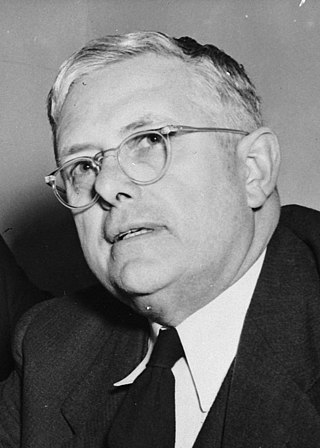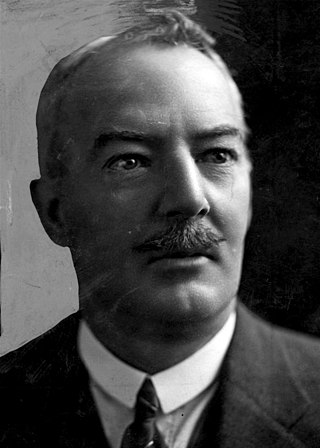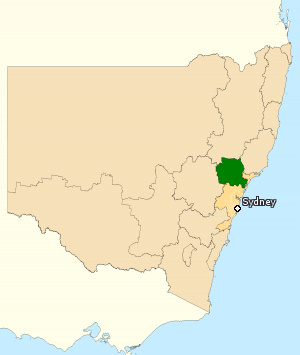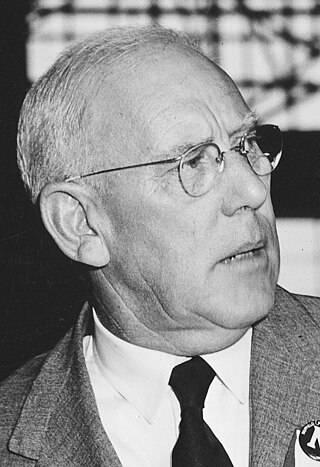Related Research Articles

Francis Michael Forde was an Australian politician who served as the 15th prime minister of Australia from 6 to 13 July 1945, in a caretaker capacity following the death of John Curtin. He was deputy leader of the Australian Labor Party (ALP) from 1932 to 1946 and is the shortest-serving prime minister in Australia's history.

The Democratic Labor Party (DLP) was an Australian political party. The party came into existence following the 1955 ALP split as the Australian Labor Party (Anti-Communist), and was renamed the Democratic Labor Party in 1957. In 1962, the Queensland Labor Party, a breakaway party of the Queensland branch of the Australian Labor Party, became the Queensland branch of the DLP.

Herbert Vere "Doc" Evatt, was an Australian politician and judge. He served as a justice of the High Court of Australia from 1930 to 1940, Attorney-General and Minister for External Affairs from 1941 to 1949, and leader of the Australian Labor Party (ALP) and Leader of the Opposition from 1951 to 1960. Evatt is considered one of Australia's most prominent public intellectuals of the twentieth century.

Edward James "Jack" Holloway was an Australian politician who served in the House of Representatives from 1929 to 1951, representing the Labor Party. He served as a government minister under James Scullin, John Curtin, Frank Forde, and Ben Chifley.

The Division of Hunter is an Australian electoral division in the state of New South Wales. The division was proclaimed in 1900, and was one of the original 65 divisions to be contested at the first federal election. The division was named after Captain John Hunter, the second Governor of New South Wales. It covers rural, regional and suburban areas centred on the Hunter Valley, including the towns of Singleton, Muswellbrook and Cessnock. It also extends into parts of Greater Newcastle, covering suburbs such as Cameron Park, Edgeworth, Toronto and Morisset.

The 1958 Australian federal election was held in Australia on 22 November 1958. All 122 seats in the House of Representatives and 32 of the 60 seats in the Senate were up for election. The incumbent Liberal–Country coalition led by Prime Minister Robert Menzies defeated the opposition Labor Party, led by H. V. Evatt.

The 1955 Australian federal election was held in Australia on 10 December 1955. All 122 seats in the House of Representatives and 30 of the 60 seats in the Senate were up for election. An early election was called to bring the House and Senate elections back in line; the previous election in 1954 had been House-only. The incumbent Liberal–Country coalition led by Prime Minister Robert Menzies increased its majority over the opposition Labor Party, led by H. V. Evatt.

The 1954 Australian federal election were held in Australia on 29 May 1954. All 121 seats in the House of Representatives were up for election, but no Senate election took place. The incumbent Liberal–Country coalition led by Prime Minister Robert Menzies defeated the opposition Labor Party led by H. V. Evatt, despite losing the two-party preferred vote. Although the ALP won the two-party preferred vote, six Coalition seats were uncontested compared to one ALP seat. The Psephos blog makes clear that if all seats had been contested, the Coalition would have recorded a higher primary vote than the ALP and possibly also a higher two-party preferred vote.

Allan Duncan Fraser was an Australian politician and journalist. He served as a member of the House of Representatives from 1943 to 1966 and from 1969 to 1972, representing the Division of Eden-Monaro for the Labor Party.

The 1982 Tasmanian state election was held on 15 May 1982 in the Australian state of Tasmania to elect 35 members of the Tasmanian House of Assembly. The election used the Hare-Clark proportional representation system — seven members were elected from each of five electorates. The quota required for election was 12.5% in each division.

Leonard James Reynolds was an Australian politician who served as a Labor member of the Parliament of Australia from 1958 to 1966 and from 1969 to 1975.
Clive Raleigh Evatt was an Australian politician, barrister and raconteur. He was a member of the New South Wales Legislative Assembly from 1939 until 1959. At various times he sat as a member of the Industrial Labor Party, Labor Party and as an independent.
Members of the New South Wales Legislative Assembly who served in the 32nd parliament held their seats from 1938 to 1941. They were elected at the 1938 state election, and at by-elections. The Speaker was Reginald Weaver.

Elections were held in the Australian state of Queensland on 3 August 1957 to elect the 75 members of the state's Legislative Assembly. The major parties contesting the election were the Queensland Labor Party led by Premier Vince Gair, the Labor Party led by former Deputy Premier Jack Duggan, and the Country-Liberal coalition led by Frank Nicklin.

The 1941 New South Wales state election was held on 10 May 1941. This election was for all of the 90 seats in the 33rd New South Wales Legislative Assembly and was conducted in single-member constituencies with compulsory preferential voting.

The 1950 New South Wales state election was held on 17 June 1950. It was conducted in single member constituencies with compulsory preferential voting and was held on boundaries created at a 1949 redistribution. The election was for all of the 94 seats in the Legislative Assembly, which was an increase of 4 seats since the previous election.

The 1956 New South Wales state election was held on 3 March 1956. It was conducted in single member constituencies with compulsory preferential voting and was held on boundaries created at a 1952 redistribution. The election was for all of the 94 seats in the Legislative Assembly.

The 1959 New South Wales state election was held on 21 March 1959. It was conducted in single member constituencies with compulsory preferential voting and was held on boundaries created at a 1957 redistribution. The election was for all of the 94 seats in the Legislative Assembly.

A general election for the Australian Capital Territory Legislative Assembly was held on Saturday, 15 October 2016.

The 2020 Australian Capital Territory general election was held on 17 October 2020 to elect all 25 members of the unicameral ACT Legislative Assembly.
References
- ↑ "By-Elections 1958-1961". Psephos.